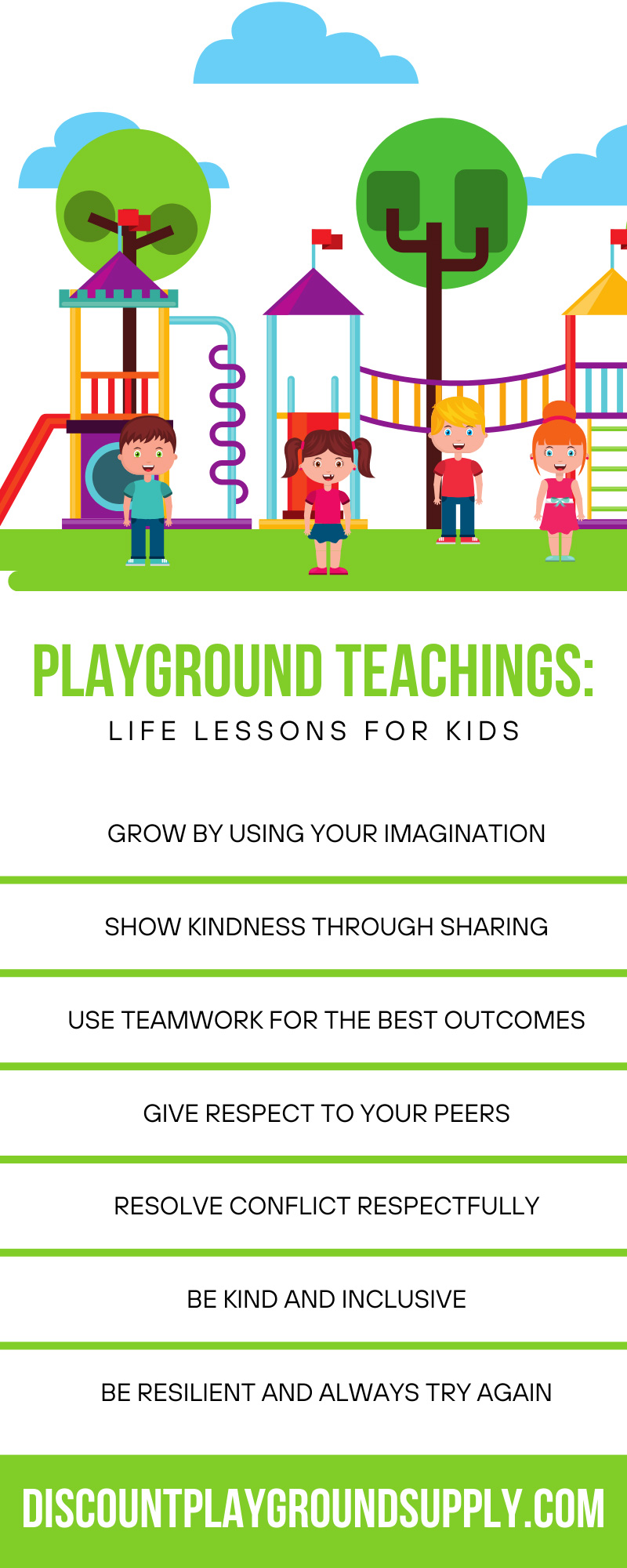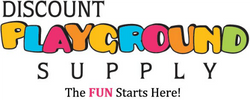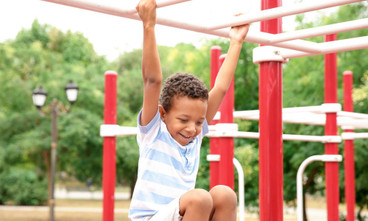The swings creak. Children pitter-patter across the playground surface. Their giggles fill the air as the group of kids rush down the slides or bound across a bridge.
The playground has plenty to teach your children, but beneath the joy of playground fun comes valuable life lessons for kids. Read on to learn how every seemingly average act of play can positively change your children’s development.
Grow by Using Your Imagination
Children are roaring with creativity! The playground offers the perfect backdrop for this kind of imaginative exploration.
Playground equipment can transform kids’ minds in the blink of an eye into a castle or a spaceship. Through imaginative play, children better their problem-solving skills and improve their cognitive development.
Children can also bring imaginative worlds together; they negotiate, collaborate, and learn to hear each other. This shared imaginative play strengthens bonds between children, as they work together to build narratives far grander than any single child could conjure alone.
As a grown-up, a strong imagination possesses multiple advantages. Some individuals will embark on artistic, theatrics, or literary pursuits. Other professionals will learn to think outside of the box to accomplish difficult projects. When imagination runs wild from childhood into adulthood, people are more capable of handling the complexities of daily endeavors.
Show Kindness Through Sharing
Sharing isn’t always simple. For young kids, sharing is a characteristic that they must learn and practice. When children play together, whether on swings, slides, or sandboxes, they learn the value of taking turns and sharing their space and toys with others.
The act of sharing fosters empathy, so children can understand their peers’ feelings and needs. In playful moments, the foundation of community-mindedness and cooperation develops as they grow.
It may seem silly to think of adults sharing toys. Although sharing looks different for grown-ups, the value of the skill never wavers.
Adults share knowledge and resources that contribute to achieving common goals. The playground acts as a catalyst for learning that sharing is not a loss of possessions but a way to enrich collective experiences and achievements.
Use Teamwork for the Best Outcomes
Teenagers and adults use teamwork with family and friends, and in professional environments. Kids need to learn this fundamental skill from a young age.
Teamwork on the playground teaches children that everyone has a unique role to play in the group’s success. Whether it’s the faster runners in relay races or the more imaginative minds in a game of pretend, each child contributes something special. This early exposure to team dynamics instills that collective efforts lead to greater achievements than solo endeavors.
Give Respect to Your Peers
Respect is a complex character trait to grasp. At their developmental stage, they are naturally egocentric and focus on personal desires and perspectives.
This self-centeredness is normal. Nevertheless, kids can learn what respect means through direct interactions.
Children will experience moments where they must share or take turns, welcome new players to a game, or accommodate kids with different abilities. Every seemingly miniscule encounter subtly strengthens the children’s abilities to respect others.
Resolve Conflict Respectfully
Conflict arises in everyday life for children, teens, adults, and seniors. No matter your age, personality, or profession, conflict is ever-present.
Kids will encounter playground situations where they can’t agree on whose turn it is or what game to play. With this type of environment and the value of developing conflict resolution skills, it’s vital for kids to learn about it early on.
Learning to resolve conflicts on the playground equips children with communication tools and emotional intelligence that are essential throughout life. They discover the importance of listening to others’ perspectives, expressing their feelings constructively, and working together to find mutually agreeable solutions. Kids gain the groundwork for healthier social interactions, teaching children to approach disagreements with an open mind and respect for other’s views.
Furthermore, the skills acquired in these early interactions extend beyond the playground. In school, children who have learned to resolve conflicts are better prepared to work on group projects, share resources, and navigate social dynamics. This ability to manage and resolve conflicts enhances their academic and extracurricular experiences while preparing them for the complexities of adulthood.
Be Kind and Inclusive
The playground is an environment where people of various backgrounds, personalities, and abilities interact. All the kids want is to release some energy, be creative, and have fun with other little ones!
Nondiscrimination comes in many forms and starts at a young age. Children learn to modify games so that everyone can join in. This demonstrates adaptability skills and emotions such as empathy. Early inclusive experiences teach children that diversity enriches group dynamics and more enjoyable playtime.
Teenage years and adulthood are the periods when inclusion becomes exceptionally important. In the workplace, inclusive teams are more innovative and effective, as they bring together diverse perspectives and strengths. In personal relationships, understanding and valuing inclusion fosters deeper connections and empathy among people from various backgrounds.
It’s easy for adult biases and negativity to project onto kids’ attitudes toward people who are different. With exposure to dynamic playground environments and diverse families, your kids are more likely to grow into inclusive and kind adults.
Be Resilient and Always Try Again
Resilience is a difficult trait to master. The simplest obstacle can hold you back from achieving a goal. The playground teaches wonderful life lessons for kids to always get back up and try again.
A little kid is hindered by a plastic playground barrier because they’re too small to step over it alone. One child can only make it halfway across the monkey bars before falling. The log is impossible to jump over. The biggest slide on the playground is terrifying!
Kids can learn resilience in the joyful yet sometimes challenging realm of play. Children gradually understand that persistence and courage can lead to eventual triumphs, such as mastering a piece of playground equipment. This environment allows them to experience and learn from failure.
Adults consistently endure failures, but they also reap the benefits of accomplishment. Without learning resilience, children and adults alike would remain stagnant in life. It’s crucial to learn how to be courageous and tough to see growth no matter the age.
Children have big emotions that they can’t always understand. However, they have the mental capacity to soak up immense information.
Next time you can’t think of a thrilling activity for your kids, take them to a local park. Every interaction with other children will be a learning experience that will positively influence their development.


